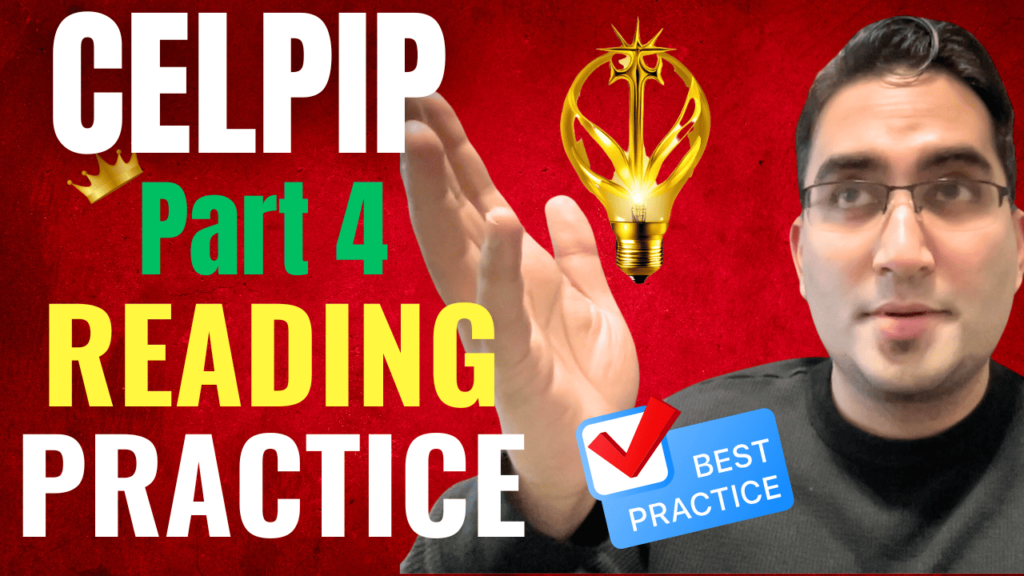CELPIP Part 4 Reading Exercise [HARD]
Preparing for the CELPIP Exercise and test can feel overwhelming, especially when it comes to Part 4 of the Reading section. This part requires not only strong reading comprehension skills but also the ability to analyze and interpret information quickly. Let’s dive into how you can confidently tackle CELPIP Part 4 Reading and achieve your desired results using this exercise.
Passage:
The dynamics of modern friendships have become a topic of extensive study and debate among psychologists and sociologists. Dr. Sylvia Harper, a prominent psychologist, argues that the nature of friendships has undergone significant changes due to the rise of social media and digital communication. According to Harper, while technology has made it easier to connect with others, it has also diluted the depth of interpersonal relationships. She claims that many friendships today are based on superficial interactions, such as likes, comments, and brief messages, rather than meaningful conversations or shared experiences. Harper believes that this shift has contributed to a sense of isolation for many individuals, as digital friendships often lack the emotional support and authenticity that come from face-to-face connections.
Harper also highlights the impact of technology on the longevity of friendships. She suggests that the constant accessibility of people online has led to an over-saturation of social interactions, making it easier for individuals to disengage or replace friendships without significant effort. As a result, she argues, friendships today are often shorter-lived and less resilient compared to those formed in pre-digital eras. Harper advocates for fostering deeper, in-person relationships by setting boundaries around digital communication and prioritizing activities that encourage meaningful connection, such as shared hobbies or volunteer work.
In contrast, Dr. Caleb Morgan, a sociologist, sees the rise of digital friendships in a more positive light. He argues that technology has democratized friendship, allowing people to connect across geographical, cultural, and social boundaries in ways that were previously impossible. Morgan contends that online friendships can be just as meaningful as traditional ones, particularly for individuals who may struggle to form connections in person due to introversion, disabilities, or geographical limitations. He also highlights the role of social media in creating communities of shared interests, where people can form bonds based on mutual passions rather than mere proximity.
Morgan acknowledges that digital friendships have their challenges but believes these can be mitigated through intentional efforts to nurture relationships. He suggests that video calls, virtual meetups, and regular communication can help build and maintain strong bonds, even in a digital context. For Morgan, the key is not to replace in-person friendships but to see digital ones as complementary, expanding the ways people can form meaningful connections.
Questions:
Questions:
1. Dr. Harper’s main criticism of digital friendships is their:
a. Lack of meaningful emotional bonds
b. Over-reliance on online activities
c. Superficiality in interactions
d. Erosion of deeper personal ties
2. According to Harper, technology has impacted friendships by:
a. Reducing their depth and longevity
b. Encouraging constant social availability
c. Increasing transient social connections
d. Limiting meaningful personal experiences
3. Dr. Morgan views digital friendships as:
a. A way to overcome social barriers
b. A substitute for traditional bonds
c. A means of fostering global unity
d. An enhancement to mutual passions
4. Harper believes friendships in the digital era are:
a. Shorter-lived and less authentic
b. Increasingly influenced by technology
c. More accessible but less valuable
d. Disconnected from personal growth
5. Morgan’s approach to addressing the challenges of digital friendships includes:
a. Promoting intentional virtual activities
b. Pushing social media interactions
c. Combining digital and valuable connections
d. Encouraging deeper online communication
Reader’s Comment:
This debate between Harper and Morgan is thought-provoking but doesn’t address the (psychological/social/cultural/technological) (6) influences that shape modern friendships. I find myself agreeing more with Morgan because (virtual relationships/digital connections/online communities/shared interests) (7) have transformed how people connect. However, I think both experts should also consider how (emotional support/social norms/communication patterns/community bonding) (8) plays a role in maintaining friendships over time. While Harper makes strong points about the downsides of digital friendships, the emphasis should be on (building stronger networks/improving communication skills/reducing online dependency/blending online and offline relationships) (9). Ultimately, friendships today can thrive if we focus on (nurturing authenticity/promoting intentionality/creating hybrid friendships/encouraging real-world interactions) (10).
Answers:
- Answer: c. Superficiality in interactions
Explanation: Dr. Harper argues that digital friendships often lack depth and are based on superficial interactions like likes and comments rather than meaningful conversations. - Answer: a. Reducing their depth and longevity
Explanation: Harper believes technology has shortened the lifespan of friendships by making social interactions less resilient and more replaceable. - Answer: a. A way to overcome social barriers
Explanation: Dr. Morgan views digital friendships as a way for people to connect across barriers like geography, introversion, or disabilities, making them more inclusive. - Answer: a. Shorter-lived and less authentic
Explanation: Harper describes digital-era friendships as often being shorter-lived and lacking the authenticity of traditional, face-to-face relationships. - Answer: a. Promoting intentional virtual activities
Explanation: Morgan suggests that intentional virtual activities, such as video calls and online meetups, can strengthen digital friendships and make them more meaningful. - Answer: b. Social
Explanation: The reader highlights the social influences, such as the way people form and maintain connections, that shape modern friendships. - Answer: c. Online communities
Explanation: The reader aligns with Morgan, pointing out that online communities have played a significant role in transforming how friendships are formed. - Answer: a. Emotional support
Explanation: The reader believes that emotional support is an essential aspect of friendships that needs to be considered in the debate about digital and traditional relationships. - Answer: d. Blending online and offline relationships
Explanation: The reader suggests that combining online and offline interactions is key to creating friendships that are both meaningful and lasting. - Answer: c. Creating hybrid friendships
Explanation: The reader concludes that hybrid friendships, which integrate both digital and in-person elements, are the best way forward for modern relationships.
Why do students fail CELPIP? This course not only explains that but GUARANTEES your results or your MONEY-BACK! With 100,000 copies sold, check out why this course has internet’s best reviews (IMMEDIATE ACCESS AVAILABLE):
BEST FREE CELPIP Videos and Advice: Hzad Education – Coaching Central
Excelling in CELPIP Part 4 Reading requires practice, strategy, and a clear understanding of the test format. By applying the tips and exercises shared here, you’ll build the skills needed to approach this section with confidence. Remember, consistent practice is key to mastering the CELPIP Reading test. Take the time to refine your strategies, and success will follow. Ready to boost your CELPIP score? Start practicing today and take one step closer to your immigration goals!


